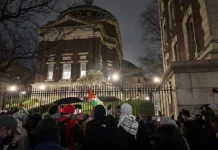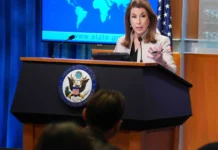More than 90 rabbis and cantors signed a letter this month to Israel’s prime minister, demanding that Israel cease firing at Hamas and release a large number of terrorists to gain the release of the hostages in the Gaza Strip. When the same clergy were asked to sign a letter calling on Qatar and Egypt to pressure Hamas to release the hostages, guess how many signed on?
Five. That’s right, just five.
The letter to Israeli Prime Minister Benjamin Netanyahu, which was organized by the “Bring Them Home Now” campaign, urged him to “finalize the deal on the table.” According to media reports, the two main components of that deal are that Israel will stop pursuing the gang rapists and baby-beheaders of Oct. 7 and will release many hundreds—perhaps even thousands—of terrorists who have murdered or attempted to murder Jews.
It’s peculiar to use the slogan “Bring Them Home Now,” which indicates that it is within Israel’s power to do so. A more appropriate slogan would have been “Let My People Go” because that would be aimed at Hamas, which is holding the hostages, and at the governments that support Hamas and could exercise leverage on it. “Bring Them Home Now” puts most or all of the onus on Israel.
That appears to have been the intent of the letter of the nearly 100 rabbis and cantors—to put pressure on Israel, to put the blame on Israel, to put all the responsibility for the fate of the hostages on Israel’s shoulders.
Nowhere in their letter did the 99 rabbis call on Hamas to surrender. Nowhere did they call for action by Qatar, which finances Hamas, or by Egypt, which controls Gaza’s western border.
So, we at Americans For A Safe Israel (AFSI) decided to organize a second letter to correct the imbalance. We sent it to all the rabbis and cantors who signed the first one.
As I explained in my cover note to these rabbis and cantors, our letter deliberately mimicked the language of the first letter, except ours was directed at Qatar and Hamas. We used the same language to make it as comfortable as possible for all 99 rabbis and cantors to sign on. If they were satisfied with the language of the first letter, then they should have been satisfied with the language of the second one—or so we assumed.
The only difference between the two letters was that instead of putting the onus exclusively on Israel, we sought to put the onus where it belongs—on those who finance Hamas or have other leverage over the terrorists. Our letter was an exercise in supreme evenhandedness.
Email can be tricky; sometimes an email goes unnoticed. So we emailed our letter, with an accompanying explanation, to all 99 rabbis and cantors not once, not twice, but three times over a six-day period. We wanted to make sure every one of them received it.
Four rabbis and one cantor agreed to sign. Ten others sent back rather coldhearted responses.
A Reform rabbi in Maryland sent a curt two-word reply: “Not interested.” Isn’t that something? It seems as if he’s “interested” in the fate of the hostages only if it gives him an opportunity to blame Israel.
A Conservative rabbi in Virginia accused us of “plagiarizing” the first letter, even after we carefully explained that we deliberately mimicked that language.
An unaffiliated rabbi in California said he would not sign it because it is, as he put it, “unevenhanded.” Funny—that didn’t stop him from signing the first one, with its “unevenhanded” pressure on Israel alone.
As for the other 70 or so, they ignored our multiple emails altogether.
What can we learn from this troubling episode?
There has been a debate in Israel and the American Jewish community in recent weeks concerning the motives of those who are demanding that Israel make more concessions to gain the release of the hostages.
Critics have charged that some of the protesters are using the hostages issue as yet another weapon to score points against a government that they already oppose on other issues. In other words, they’re exploiting the hostages in order to advance their political agenda.
By refusing to sign a petition that used their own language—with the only difference being that it is addressed to Qatar and Egypt—these rabbis have lent credence, perhaps, some unwittingly, to the accusations of their critics. Refusing to call on Qatar and Egypt to pressure Hamas suggests that they are primarily interested in pressuring only Israel.
What a tragedy that the fate of innocent Israelis and American hostages should be undermined by such cynicism, hypocrisy and political point-scoring. Kudos to the four lonely rabbis and one cantor who agreed to press Qatar and Egypt. And shame on their colleagues.


























